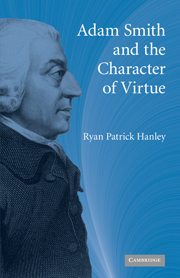Book contents
- Frontmatter
- Contents
- Preface
- Acknowledgments
- Abbreviations
- Introduction
- 1 The Problem: Commerce and Corruption
- 2 The Solution: Moral Philosophy
- 3 Interlude: The What and the How of TMS VI
- 4 Prudence, or Commercial Virtue
- 5 Magnanimity, or Classical Virtue
- 6 Beneficence, or Christian Virtue
- Epilogue: The “Economy of Greatness”
- Index
Epilogue: The “Economy of Greatness”
Published online by Cambridge University Press: 06 November 2009
- Frontmatter
- Contents
- Preface
- Acknowledgments
- Abbreviations
- Introduction
- 1 The Problem: Commerce and Corruption
- 2 The Solution: Moral Philosophy
- 3 Interlude: The What and the How of TMS VI
- 4 Prudence, or Commercial Virtue
- 5 Magnanimity, or Classical Virtue
- 6 Beneficence, or Christian Virtue
- Epilogue: The “Economy of Greatness”
- Index
Summary
The foregoing study sought to develop several propositions with regard to Adam Smith's moral and political philosophy. Stated briefly, these propositions include the claims that Smith was a true friend of capitalism insofar as he not only championed it but also criticized it; that Smith's criticism was fertile rather than sterile insofar as it prompted an extended though unheralded normative remedy; that this normative remedy was founded on a conception of virtue that embraces the greatness and flourishing of the individual in his totality and thus distances Smith from the concerns of classical republicanism and of modern social science; that Smith's conceptions of both the specific vices of commercial society and the specific virtues necessary for its remedy are founded on a reevaluation of self-love; that the dialectical product of this remedy represents a synthesis of commercial and classical and Christian virtues; and that the emulation of the life of the peak of these ethical virtues – that of the wise and virtuous man – was a conscious aim of Smith himself.
In developing these claims, this study has particularly emphasized Smith's propensity to dialectic, or the resolution of seeming opposites through a synthesis that in turn makes possible the realization of new horizons that require our renewed application. This dialectical approach has been evident in Smith's efforts to resolve specific tensions on several levels.
- Type
- Chapter
- Information
- Adam Smith and the Character of Virtue , pp. 209 - 212Publisher: Cambridge University PressPrint publication year: 2009



